raise;rise的用法
raise与rise的区别用法

raise与rise的区别用法Raise和rise这两个词可真是让好多小伙伴头疼呢,今天咱们就来好好唠唠它们的区别用法。
一、基本含义。
Raise是个及物动词,啥叫及物动词呢?就是它后面得跟着个东西,就像个小跟班似的。
比如说,“raise your hand”(举起你的手),这里的“your hand”就是它带着的小跟班。
它有很多意思呢,像“提高、提升、养育、筹集”。
就像我们说“raise the salary”(提高工资),老板要是说要给你“raise the salary”,那可真是个好消息呢。
还有“raise a child”(养育一个孩子),这可不容易呀,得花好多心血呢。
再比如说“raise money”(筹集资金),要是想搞个什么活动,就得想办法“raise money”。
而rise呢,它是个不及物动词,就比较特立独行啦,不需要后面跟着个小跟班。
它主要的意思是“上升、升起、上涨”。
比如“the sun rises”(太阳升起),每天早上太阳公公“rise”的时候,感觉新的一天就充满了希望呢。
还有“the price rises”(价格上涨),这时候我们就会觉得有点小郁闷啦,东西变贵了嘛。
二、用法区别。
1. 在句子结构上。
因为raise是及物动词,所以在句子里经常是“主语 + raise + 宾语”这样的结构。
比如说,“They raise a lot of questions.”(他们提出了很多问题)。
这里“they”是主语,“a lot of questions”就是宾语啦。
而rise呢,因为是不及物动词,它的句子结构就是“主语 + rise”。
像“Smoke rises.”(烟升起),“smoke”自己就可以“rise”,不需要后面再跟着啥东西。
2. 在表示“上升”这个意思的时候。
虽然它们都有上升的意思,但是用法不太一样。
“raise”往往是人为地使某个东西上升,是一种主动的行为。
比如说“raise the flag”(升旗),这是有人去把旗升起来的。
raise和rise的用法

raise和rise的用法1.引言在英语中,r ai se和r is e是两个常用的动词,然而很多学习者经常对它们的用法感到困惑。
本文旨在通过清晰、简洁且生动的语言,解释r a is e和ri se的用法,帮助读者正确应用这两个词汇。
2. ra ise的用法2.1及物动词在及物动词的用法中,ra ise表示提高或抬起某物,并且必须有对象。
例如:-H er ai se dh is ha ndt o as ka qu es ti on.(他举起手来问问题。
)-S he ra is es he rv oic e wh en sh ei sa ng ry.(她生气时会提高声音。
)2.2非及物动词在非及物动词的用法中,ra is e表示增加或升高某种情况,不需要对象。
例如:-T he pr ic es of go ods h av er ai se dr ec ent l y.(物价最近上涨了。
)-T he te mp er at ur era i se si ns um me r.(夏季气温升高。
)3. ri se的用法3.1不及物动词R i se是一个常用的不及物动词,意为上升或升起,通常没有宾语。
例如:-T he su nr is es in the e as t.(太阳从东方升起。
)-T he sm ok er os ef rom t he ch im ne y.(烟从烟囱升起。
)3.2副词修饰R i se也可以被副词修饰,表达起床或站立的意思。
例如:-H er os ee ar ly in the m or ni ng.(他早上早早起床。
)-T he au di en ce ro sea n da pp la ud ed.(观众起立鼓掌。
)4. ra ise和r i s e的区别4.1含义R a is e通常指提高、升高,常用于及物动词的形式;而ri se则表示上升、升起,常用于不及物动词的形式。
Rise-raise的区别及练习
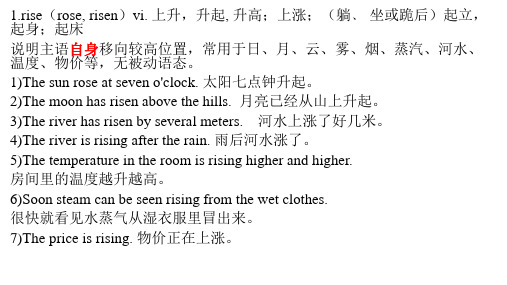
填空 4. The people's living standard has greatly been ______. 5. Her temperature is still ______. 6.They ______ glasses to the friendship between the two peoples just now. 7. This weight is too heavy; I can't ______it. 这东西太重,我举不起来。 9.Salaries have been ______. 现在薪水已增加了。 选择 1. The prices are ______ fast these days. Nobody can get the prices ______. A. going down; to bring down B. rising; bring down C. raising; bring down D. rising; brought down. 2. They've ______ up to 20,000 yuan for the Hope Project. A. rose B. raise C. raised D. risen 4. Last year the advertising rate________by 20 percent. A. raised B. rose 4. raised 5. rising 6.raised 注意时态 7.raise9.raisede vt. 说明主语发出的动作是要作用于其它事物的,往往有使物体 达到其应有的高度的含义。可用于被动语态。如: 1)招募:to raise an army 2)养育、栽培:to raise a family 3)提高raise salaries工资, raise the rent租金。 4)举起raise one's hand 5)提出问题 raise a question 1)Salaries have now been raised. 现在薪水已增加了。 2)The price was raised to £10. 价格涨到十英镑。 3)Heavy rain raised the river stage. 暴雨使河水水位升高。 4)The boss promised to raise her salary. 老板答应要给她加薪水。
动词近义词辨析
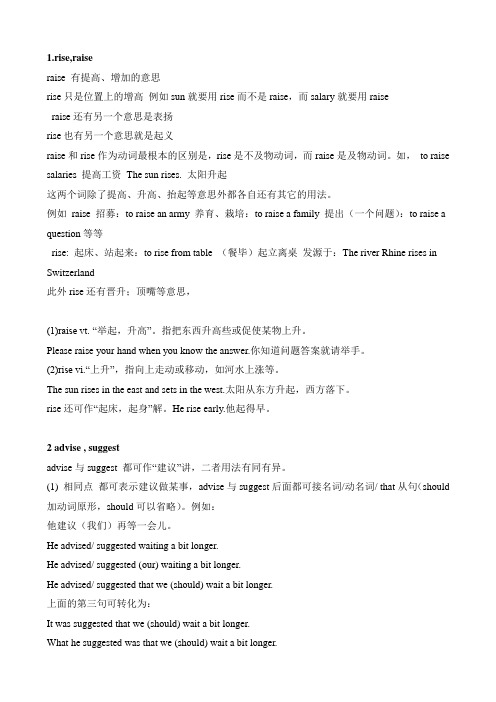
1.rise,raiseraise 有提高、增加的意思rise只是位置上的增高例如sun就要用rise而不是raise,而salary就要用raiseraise还有另一个意思是表扬rise也有另一个意思就是起义raise和rise作为动词最根本的区别是,rise是不及物动词,而raise是及物动词。
如,to raise salaries 提高工资The sun rises. 太阳升起这两个词除了提高、升高、抬起等意思外都各自还有其它的用法。
例如raise 招募:to raise an army 养育、栽培:to raise a family 提出(一个问题):to raise a question等等rise: 起床、站起来:to rise from table (餐毕)起立离桌发源于:The river Rhine rises in Switzerland此外rise还有晋升;顶嘴等意思,(1)raise vt. “举起,升高”。
指把东西升高些或促使某物上升。
Please raise your hand when you know the answer.你知道问题答案就请举手。
(2)rise vi.“上升”,指向上走动或移动,如河水上涨等。
The sun rises in the east and sets in the west.太阳从东方升起,西方落下。
rise还可作“起床,起身”解。
He rise early.他起得早。
2 advise , suggestadvise与suggest 都可作“建议”讲,二者用法有同有异。
(1) 相同点都可表示建议做某事,advise与suggest后面都可接名词/动名词/ that从句(should 加动词原形,should可以省略)。
例如:他建议(我们)再等一会儿。
He advised/ suggested waiting a bit longer.He advised/ suggested (our) waiting a bit longer.He advised/ suggested that we (should) wait a bit longer.上面的第三句可转化为:It was suggested that we (should) wait a bit longer.What he suggested was that we (should) wait a bit longer.His suggestion was that we (should) wait a bit longer.(2)不同点①advise后可以直接跟人称代词作宾语,如:advise sb. to do sth.; advise sb. against (doing) sth.; advise sb. on/ about sth.; 而suggest后一般用suggest sb that …形式。
rise和raise的用法
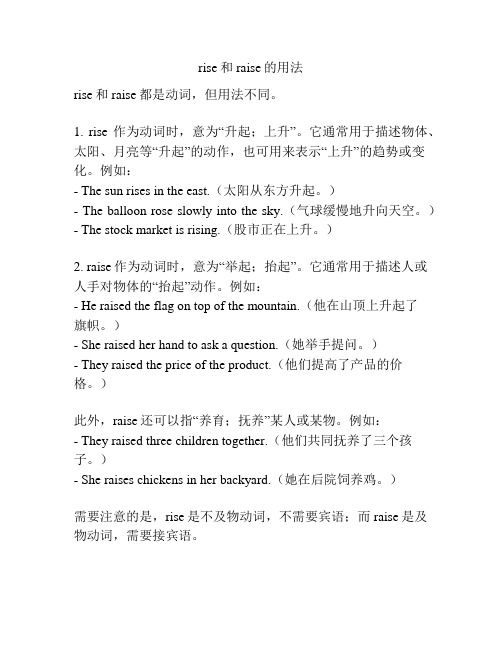
rise和raise的用法
rise和raise都是动词,但用法不同。
1. rise作为动词时,意为“升起;上升”。
它通常用于描述物体、太阳、月亮等“升起”的动作,也可用来表示“上升”的趋势或变化。
例如:
- The sun rises in the east.(太阳从东方升起。
)
- The balloon rose slowly into the sky.(气球缓慢地升向天空。
)- The stock market is rising.(股市正在上升。
)
2. raise作为动词时,意为“举起;抬起”。
它通常用于描述人或人手对物体的“抬起”动作。
例如:
- He raised the flag on top of the mountain.(他在山顶上升起了
旗帜。
)
- She raised her hand to ask a question.(她举手提问。
)
- They raised the price of the product.(他们提高了产品的价格。
)
此外,raise还可以指“养育;抚养”某人或某物。
例如:
- They raised three children together.(他们共同抚养了三个孩子。
)
- She raises chickens in her backyard.(她在后院饲养鸡。
)
需要注意的是,rise是不及物动词,不需要宾语;而raise是及物动词,需要接宾语。
raise,rise,arise的区别(精选范文)
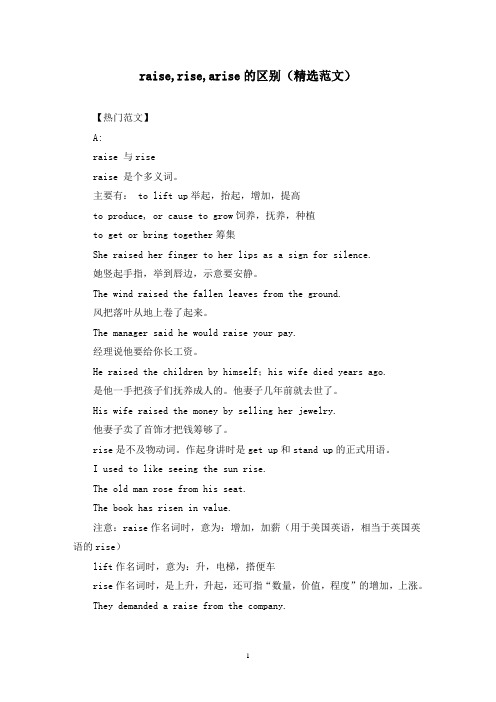
raise,rise,arise的区别(精选范文)【热门范文】A:raise 与riseraise 是个多义词。
主要有: to lift up举起,抬起,增加,提高to produce, or cause to grow饲养,抚养,种植to get or bring together筹集She raised her finger to her lips as a sign for silence.她竖起手指,举到唇边,示意要安静。
The wind raised the fallen leaves from the ground.风把落叶从地上卷了起来。
The manager said he would raise your pay.经理说他要给你长工资。
He raised the children by himself;his wife died years ago.是他一手把孩子们抚养成人的。
他妻子几年前就去世了。
His wife raised the money by selling her jewelry.他妻子卖了首饰才把钱筹够了。
rise是不及物动词。
作起身讲时是get up和stand up的正式用语。
I used to like seeing the sun rise.The old man rose from his seat.The book has risen in value.注意:raise作名词时,意为:增加,加薪(用于美国英语,相当于英国英语的rise)lift作名词时,意为:升,电梯,搭便车rise作名词时,是上升,升起,还可指“数量,价值,程度”的增加,上涨。
They demanded a raise from the company.1。
辨析raise和rise
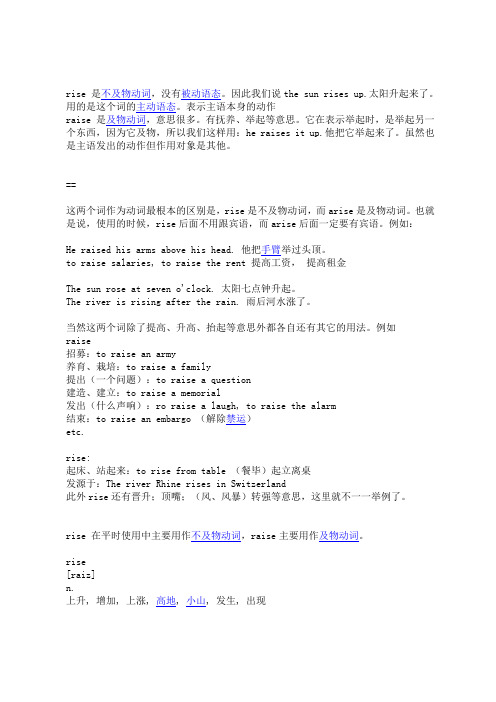
rise 是不及物动词,没有被动语态。
因此我们说the sun rises up.太阳升起来了。
用的是这个词的主动语态。
表示主语本身的动作raise 是及物动词,意思很多。
有抚养、举起等意思。
它在表示举起时,是举起另一个东西,因为它及物,所以我们这样用:he raises it up.他把它举起来了。
虽然也是主语发出的动作但作用对象是其他。
==这两个词作为动词最根本的区别是,rise是不及物动词,而arise是及物动词。
也就是说,使用的时候,rise后面不用跟宾语,而arise后面一定要有宾语。
例如:He raised his arms above his head. 他把手臂举过头顶。
to raise salaries, to raise the rent 提高工资,提高租金The sun rose at seven o'clock. 太阳七点钟升起。
The river is rising after the rain. 雨后河水涨了。
当然这两个词除了提高、升高、抬起等意思外都各自还有其它的用法。
例如raise招募:to raise an army养育、栽培:to raise a family提出(一个问题):to raise a question建造、建立:to raise a memorial发出(什么声响):ro raise a laugh, to raise the alarm结束:to raise an embargo (解除禁运)etc.rise:起床、站起来:to rise from table (餐毕)起立离桌发源于:The river Rhine rises in Switzerland此外rise还有晋升;顶嘴;(风、风暴)转强等意思,这里就不一一举例了。
rise 在平时使用中主要用作不及物动词,raise主要用作及物动词。
rise[raiz]n.上升, 增加, 上涨, 高地, 小山, 发生, 出现vi.升起, 起身, 发源, 起义, 高耸, 增长, 上升, 复活vt.使飞起rise[raIz]vi.rose, risen, rising(太阳、月亮、星星)升起,出现The sun rose at seven o'clock.太阳七点钟升起。
rise raise的用法区别
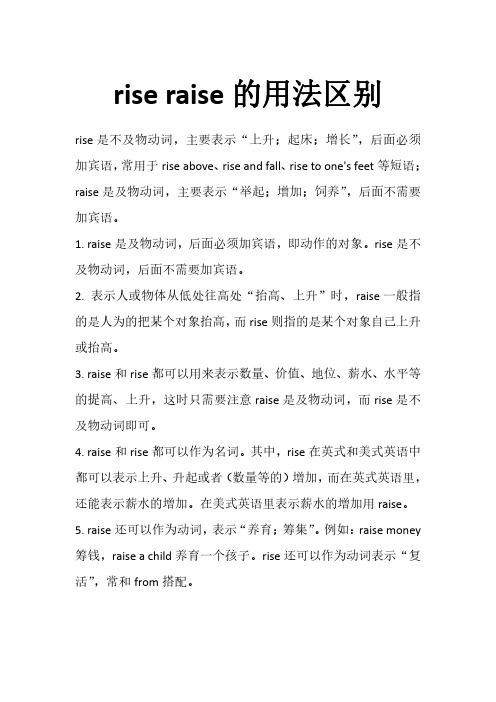
rise raise的用法区别
rise是不及物动词,主要表示“上升;起床;增长”,后面必须加宾语,常用于rise above、rise and fall、rise to one's feet等短语;raise是及物动词,主要表示“举起;增加;饲养”,后面不需要加宾语。
1.raise是及物动词,后面必须加宾语,即动作的对象。
rise是不及物动词,后面不需要加宾语。
2.表示人或物体从低处往高处“抬高、上升”时,raise一般指的是人为的把某个对象抬高,而rise则指的是某个对象自己上升或抬高。
3.raise和rise都可以用来表示数量、价值、地位、薪水、水平等的提高、上升,这时只需要注意raise是及物动词,而rise是不及物动词即可。
4.raise和rise都可以作为名词。
其中,rise在英式和美式英语中都可以表示上升、升起或者(数量等的)增加,而在英式英语里,还能表示薪水的增加。
在美式英语里表示薪水的增加用raise。
5.raise还可以作为动词,表示“养育;筹集”。
例如:raise money 筹钱,raise a child养育一个孩子。
rise还可以作为动词表示“复活”,常和from搭配。
- 1、下载文档前请自行甄别文档内容的完整性,平台不提供额外的编辑、内容补充、找答案等附加服务。
- 2、"仅部分预览"的文档,不可在线预览部分如存在完整性等问题,可反馈申请退款(可完整预览的文档不适用该条件!)。
- 3、如文档侵犯您的权益,请联系客服反馈,我们会尽快为您处理(人工客服工作时间:9:00-18:30)。
例如:The sun rises in the east. 太阳从东方升起。 When does he rise every day? 他每天几点床? Prices are rising. 物价在上涨。 Accustomed to rising early 习惯于早起。 He rose to welcome me.他起身欢迎我。
1、raise的意思是“提高”、“举起”,是及物动词, 既能接宾语,也能用于被动语态。它的宾语一般是头、 手、眼、帽、重物以及政治觉悟、生活水平、物价、温 度、声音等 。 raise one’s hand 举手 raise a flag 升旗 raise a stone 搬石头 raise one’s voice 提高嗓门说话 raise the rate of production 提高生产效率 raise standards of service 提高服务水平
rose (起身) He played so well that everyone_____ to applaud him
